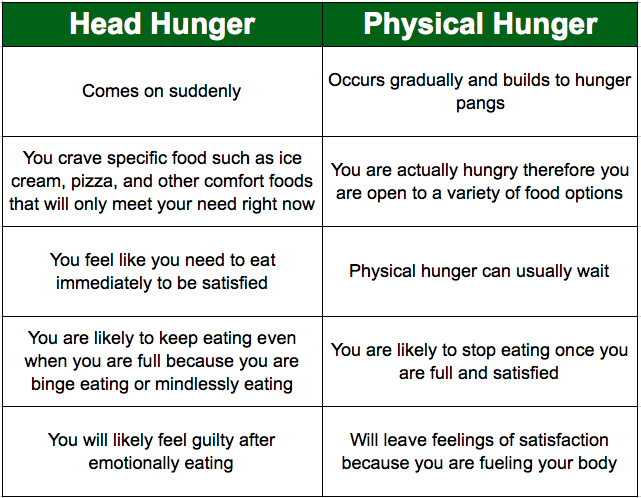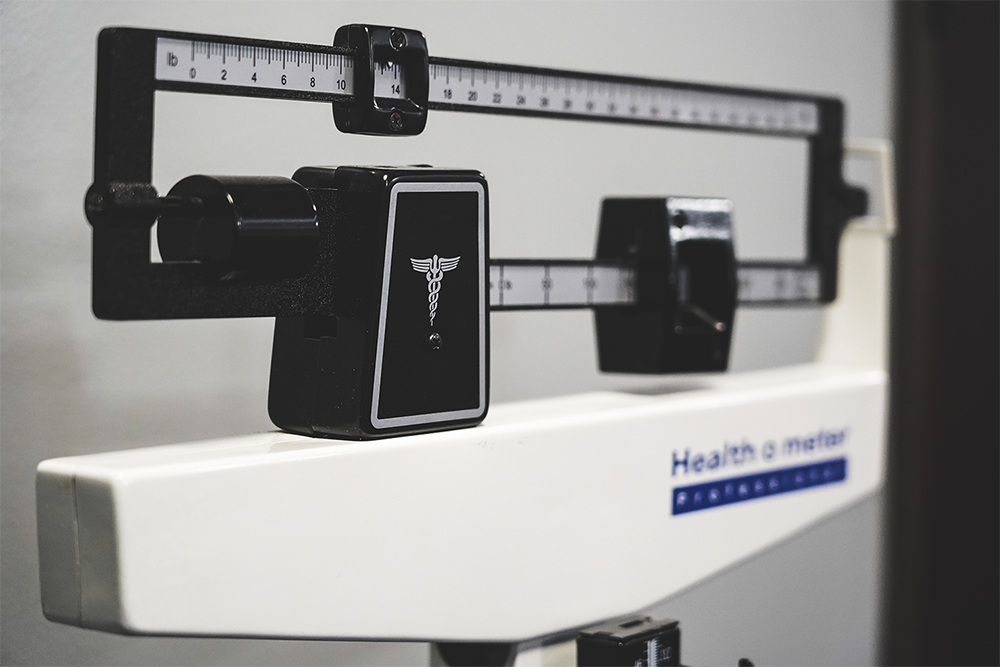
Have you ever felt "hungry" an hour after eating a full meal? Do you often times find yourself munching after dinner just because it "sounds good"? Well, you are not alone! Many of us confuse head hunger with physical hunger, which can lead to weight gain and other health related problems due to the type and amount of food being consumed. Once you are able to identify the difference between head hunger and physical hunger, your weight loss will be much easier to manage. Similarly once you are aware of your own environmental or emotional triggers, you can cope with your head hunger more effectively and successfully!
Emotional Eating
Emotional eating is eating for reasons other than hunger like stress, anger, confusion, disappointment, depression, or feeling overwhelmed. Typically, people emotionally eat to comfort themselves, avoid certain feelings, or experience certain emotions. Instead of the physical symptom of hunger initiating the eating, an emotion triggers the eating.
While the occasional emotional eating episode may appear harmless, it can escalate into something more serious and challenging to control. When eating becomes your only coping strategy to deal with emotions, you can create unhealthy habits and therefore lead to excess weight gain.
Head Hunger vs. Physical Hunger

Managing Emotional Eating: Be sensible
Here are a few tips to help you deal with emotional eating:
1. Recognize emotional eating and learn what triggers this behavior in you.
2. Make a list of things to do when you get the urge to give into head hunger. When you feel overwhelmed, you can put off that desire by doing another enjoyable activity.
3. Try taking a walk, calling a friend, playing cards, cleaning your room, doing laundry, or something productive to take your mind off the craving.
4. When you do get the urge to eat when you’re not hungry, find a comfort food that’s healthy instead of junk food. Comfort foods don’t just need to be unhealthy. Try carrots and hummus or celery and a tablespoon of peanut butter. Remember, moderation is key here (see #5 below)!
5. For some, leaving comfort foods behind when they’re dieting can be emotionally difficult. The key is moderation, not elimination. Try dividing comfort foods into smaller portions. For instance, if you have a large bag of chips, divide it into smaller containers or baggies and the temptation to eat more than one serving can be avoided.
6. When it comes to comfort foods that aren’t always healthy, like fattening desserts, realize that your memory of a food peaks after about four bites. When you only have those four bites, a week later you’ll recall it as a good experience compared to a negative experience if you polished off the whole thing. So have a few bites of cheesecake, then call it quits, and you’ll get equal the pleasure with lower cost to your waistline.
It’s important not to beat yourself up for having a treat. If your going to eat a treat give thanks and say "Hey, I’m giving myself a treat, it’s ok.” It’s more harmful to eat out of emotional fulfillment than to just have a treat now and again with gratitude.
Food and Feelings
Emotions are common triggers for eating. People sometimes eat to cope with stress, distract themselves from difficult emotions or stuff down feelings they don’t know how to express in a healthier manner.
However, boredom, anger, anxiety, loneliness, stress and other feelings are a natural part of our lives, and eating won’t make them go away. In fact, eating in response to these feelings disconnects you from important information about what you need. For example, “I want brownies” might really indicate that “I want comfort,” “I need a reward,” “I wish I had a friend to talk to” or “I wish I could tell you how I really feel.”
The food you eat to deal with feelings comes with strings attached—weight gain and regret. But more importantly, it denies you the opportunity to discover and satisfy your true needs. Since eating cannot meet your emotional needs, those unmet needs trigger overeating again and again.
The way to break out of this pattern is to stop judging yourself when you overeat and instead try to figure out what you need that drives you to eat when you aren't physically hungry. Examining your current eating behavior can be a powerful source of information about your inner self and your true needs and wants. Once you have identified the emotions that triggered the urge to eat, seek ways to comfort, nurture, calm and distract yourself without turning to food.
Remember that emotional eating is something that most people do when they’re bored, happy, or sad. It might be a bag of chips or ice cream, but whatever the food choice, learning how to control it and using moderation are key.











